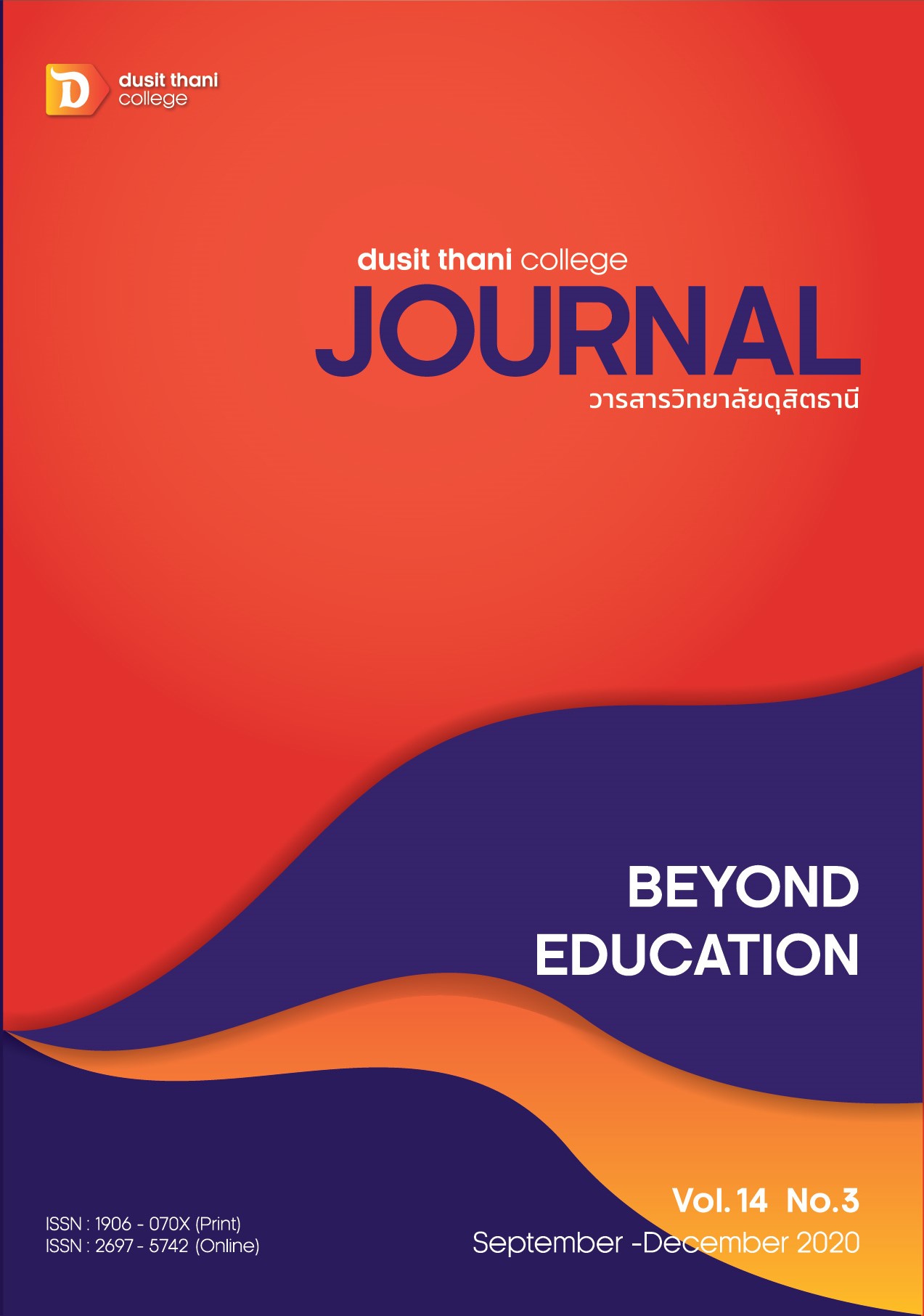ความสัมพันธ์ของคุณลักษณะความเป็นผู้ประกอบการต่อผลของการดำเนินกิจการของธุรกิจการให้บริการเพื่อการท่องเที่ยวในประเทศไทย
Main Article Content
บทคัดย่อ
การวิจัยในครั้งนี้มีวัตถุประสงค์เพื่อศึกษาอิทธิพลของคุณลักษณะความเป็นผู้ประกอบการต่อผลของการดำเนินกิจการของธุรกิจการให้บริการเพื่อการท่องเที่ยวในประเทศไทย ใช้การวิเคราะห์ค่าอิทธิพลของตัวแปรโดยใช้สถิติเชิงอนุมาน โดยวิธีการใช้สถิติการถดถอยพหุคูณ ในการวิเคราะห์ข้อมูล
ผลการวิจัยพบว่า คุณลักษณะความเป็นผู้ประกอบการธุรกิจให้บริการเพื่อการท่องเที่ยวขนาดกลางและขนาดย่อมที่มีอิทธิพลต่อประสิทธิผลของการดำเนินงานของกิจการ ได้แก่ คุณลักษณะความเป็นผู้ประกอบการด้านความกล้าเผชิญความเสี่ยงมีอิทธิพลต่อประสิทธิผลของการดำเนินงานของกิจการด้านการเงินระดับสูงซึ่งผู้ประกอบการส่วนใหญ่เห็นว่าการดำเนินธุรกิจที่มีความเสี่ยงสูงจะทำให้ได้รับผลตอบแทนที่สูง เช่นเดียวกับคุณลักษณะความเป็นผู้ประกอบการด้านการสร้างนวัตกรรมมีความสัมพันธ์กับประสิทธิผลของการดำเนินงานของกิจการด้านกระบวนการภายในระดับสูงซึ่งผู้ประกอบการส่วนใหญ่เห็นว่าควรให้ความสำคัญกับการพัฒนานวัตกรรมเทคโนโลยีด้านการให้บริการให้เหนือคู่แข่งอยู่เสมอ สอดคล้องกับคุณลักษณะความเป็นผู้ประกอบการด้านการดำเนินกิจการเชิงรุกมีความสัมพันธ์กับประสิทธิผลของการดำเนินงานของกิจการด้านการเงินระดับสูง ซึ่งผู้ประกอบการส่วนใหญ่มีความพยายามอย่างมากที่จะทำให้กิจการมีความเป็นผู้นำทางธุรกิจเหนือคู่แข่ง เนื่องจากการดำเนินกิจการเชิงรุกมีการติดตามและตรวจสอบรวมไปถึงการระบุแนวโน้มความต้องการของลูกค้าที่มีอยู่ในตลาดเดิม
Article Details
นโยบายการพิจารณากลั่นกรองบทความ
- บทความวิจัยและบทความวิชาการทุกเรื่องที่จะได้รับการตีพิมพ์ต้องผ่านการพิจารณากลั่นกรองโดยผู้ทรงคุณวุฒิ (Peer Review) ในสาขาที่เกี่ยวข้อง จำนวน 3 ท่าน/บทความ
- บทความ ข้อความ ภาพประกอบและตารางประกอบที่ลงตีพิมพ์ในวารสารเป็นความคิดเห็นส่วนตัวของผู้เขียน กองบรรณาธิการไม่จำเป็นต้องเห็นด้วยเสมอไป และไม่มีส่วนรับผิดชอบใด ๆ ถือเป็นความรับผิดชอบของผู้เขียนแต่เพียงผู้เดียว
- บทความที่จะได้รับการตีพิมพ์จะต้องไม่เคยตีพิมพ์ เผยแพร่ที่ใดมาก่อน และไม่อยู่ระหว่างการพิจารณาของวารสารฉบับอื่น หากตรวจสอบพบว่ามีการตีพิมพ์ซ้ำซ้อน ถือเป็นความรับผิดชอบของผู้เขียนแต่เพียงผู้เดียว
- บทความใดที่ผู้อ่านเห็นว่าได้มีการลอกเลียนหรือแอบอ้างโดยปราศจากการอ้างอิง หรือทำให้เข้าใจผิดว่าเป็นผลงานของผู้เขียน กรุณาแจ้งให้กองบรรณาธิการวารสารทราบจะเป็นพระคุณยิ่ง
เอกสารอ้างอิง
Covin, J. G., & Slevin, D. P. (1991). A conceptual model of entrepreneurship as rm behavior (Vol. 16).
Janthima Jatupornstearakul (2011). The study of Entrepreneur orientation and Business Strategy that related to the Success of Drug Store Business of Thai pharmacists who are the owner of drugstore. Master Thesis. Thammasat University.
Kaplan, & Norton. (1992). The Balance Scorecard Measurers that Drive Performance Boston: Harvard Business School Press.
Kaplan, R. S., & Norton, D. P. (1996). The Balance Scorecard: Translating Strategy into Action. Boston: Harvard Business School Press.
Kassara Sukpet.(2014) Thai tourism supply chain management strategy to support quality Chinese tourists. Center for Government System Reform and Project Evaluation Research: National Institute of Development Administration.
Kuratko, D. F., Morris, M. H., & Covin, J. G. (2011). Corporate Innovation and Entrepreneurship. South-Western: Cengage Learning.
Lumpkin, G. T., Brigham, K. H., & Moss, T. W. (2010). Entrepreneurship & Regional Development, 22(3-4), 241-264.
Lumpkin, G. T., & Dess, G. G. (1996). Clarifying the Entrepreneurial Orientation Construct and Linking It to Performance. The Academy of Management Review, 21(1), 35-172.
Miller, D. (1983). The correlates of entrepreneurship in three types of rms. . Management Science, 29(7), 770-791.
Porter, M. E. (1985). Competitive Advantage: Creating and Sustaining Superior Performance. New York: Free Press.
Rauch, A., Wiklund, J., Lumpkin, G. T., & Frese, M. (2009). Entrepreneurial Orientation and Business Performance: An Assessment of Past Research and Suggestions for the Future. Entrepreneurship Theory and Practice, 33(3), 761–787.
Sirichai Kanjanawasee. (2000). How to use the SPSS computer program for research: analysis and interpretation: Chulalongkorn University press.
Sutheera Atawongsa.(2014) Effects of Entrepreneurial Orientation and Enterprise Characteristics Toward Thai SMEs’ Growth. Suthiparithat Journal, 28(85), 61-79.
The Office of Small and Medium Enterprises Promotion (2017).Gross Domestic Product of SMEs report 201.7
Walter, A., Auer, M., & Ritter, T. (2006). The impact of network capabilities and entrepreneurial orientation on university spin-off performance. Journal of Business Venturing, 21(4), 541–567.


